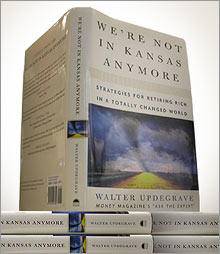
|
|
More information on Updegrave's new book.
|
|
|
|
NEW YORK (CNN/Money) -
I'm about 13 years from retirement and my 401(k) has a diversified blend of investments including a Standard & Poor's 500 index fund, small caps and a REIT fund. Instead of maxing out my allowable contribution, I'm considering contributing just enough to get the employer match and then investing the rest in real estate, a beach property to be specific. Do you think this is a good idea?
-- Terry Mottley, Suffolk, Virginia
Actually, I'm beginning to think that maybe you've been spending too much time at the beach already and that your brain is being addled by the sun.
Think about it. You've already put together what sounds like a pretty thoughtful retirement investment portfolio that includes not just large- and small-cap stocks, but real estate as well through REITs. And now you're saying you want to increase your exposure to real estate, but you want to do it in a much less diversified way.
Take a closer look at the idea
With all the hoopla about gains in the real estate market the last few years, buying a beachfront property might seem like a no-risk proposition. But that's not the case.
You will be investing your money in one property on one block in one area in one city. If you were to put a lot of money in one individual stock, you would be incurring what investing pros call "specific stock" risk. That is, your investment could go down the tubes if something goes kerflooey not with the markets, but with this particular company -- a new product turns out to be a dud, the management team gets an unwelcome visit from Eliot Spitzer, whatever.
In the case of buying one property as an investment, you are taking on what you might call "specific property" risk. Your investment could suffer if there's a problem not only with that particular property, but with the area in which it's located.
Maybe environmental restrictions will limit the way the property can be used and thus hurt its market value. Or maybe development will occur on the other side of town, making other properties more desirable. Or maybe you'll end up buying at such a high price that the potential for further gain is severely limited.
The point is that anytime you put your eggs in one basket, you're taking on more risk than if you spread your eggs around into many baskets, or properties. That's the whole idea behind diversification.
Don't give up tax benefits
Another thing I don't like about your plan is that you are giving up the tax benefit of maxing out on your 401(k). Yes, I know investment real estate has some tax advantages too. But the 401(k)'s tax bennies are so easy to take advantage of, it makes little sense to me to pass them up to invest in something that involves more hassle and risk.
In fact, it makes so little sense that I can't help but wonder if you've arrived at this idea not so much through a logical look at all the possibilities, but because big gains in real estate have become almost a national obsession.
My advice is that you contribute as much as you can to your 401(k) and continue to get your real estate exposure through REITs or mutual funds that invest in real-estate related securities.
If you've maxed out on your 401(k) and still have money left over and you want to buy a beach property for your own enjoyment -- perhaps something to retire to in 13 years -- that's fine. But I wouldn't be so quick to make a beachfront property a part of my investment portfolio.
Walter Updegrave is a senior editor at MONEY Magazine and is the author of "We're Not in Kansas Anymore: Strategies for Retiring Rich in a Totally Changed World."

|